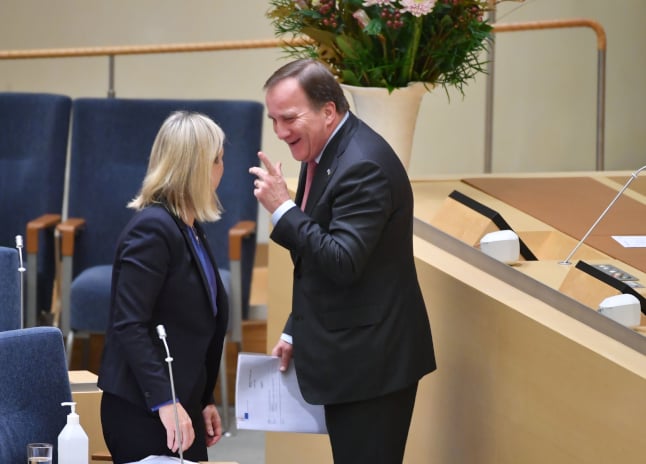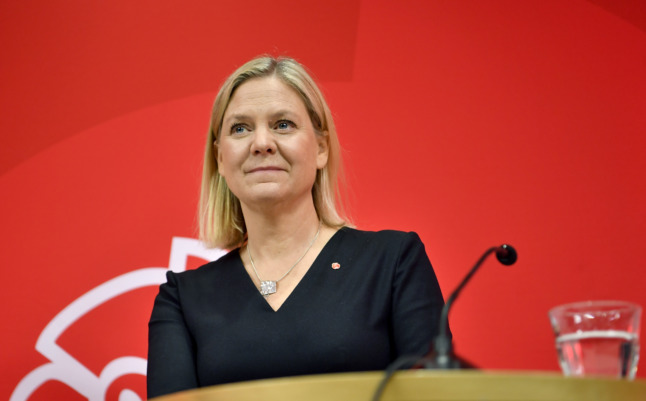1. What is her career and political history?
Magdalena Andersson has held her position of Sweden’s finance minister since 2014, retaining the position through all three Löfven governments.
In terms of politics, she has been a member of the Social Democrats since 1983 when she joined the youth branch of the organisation as a 16-year-old, being elected chairperson of the Uppsala branch four years later.
Her engagement with the Social Democrats continued alongside studies at Stockholm School of Economics, where she was elected chairperson of the Social Democratic Student Association in 1991.
After her studies, she worked in the prime minister’s office between 1996 and 2004, first as a political advisor, later as director of planning.
This was followed by two years as state secretary in the Finance Department, two years as advisor to then-leader of the Social Democrats Mona Sahlin, and three years as senior director at the Swedish Tax Agency. In 2012 Stefan Löfven appointed her to the role of economic-political spokesperson of the Social Democrats, a role she held until she was elected to the Swedish parliament (and government) in 2014.
2. What did she study?
Andersson is a trained economist, who has studied at Stockholm School of Economics, at the Institute for Advanced Studies in Vienna, and at Harvard University in the US.
She has a masters in economics and was working towards a PhD which she decided not to complete once she was offered the role as political advisor in the Prime Minister’s office.
She also met her husband during their studies at Stockholm School of Economics, where he currently works as a professor.
3. What are her plans as prime minister?
After being confirmed as the Social Democrats’ new leader, Andersson outlined three political priorities going forward.
She said she wanted to “take back democratic control of schools, healthcare and elderly care”, and move away from welfare sector privatisation.
She also said she aimed to make Sweden a worldwide role model in climate transition.
And she vowed to end segregation, as well as the shootings and bombings that have plagued the country in recent years – usually due to gangs settling scores or battling over the drug market – mainly affecting disadvantaged neighbourhoods with large immigrant populations.
Andersson was involved in a position paper earlier this year which could suggest that she is considerably further to the left than her cautious handling of Sweden’s accounts as finance minister would suggest.
The document is titled Fördelningspolitik för jämlikhet och rättvisa, which translates roughly as “Redistributive policy for equality and justice”.
It was created in collaboration with a number of other politicians as part of a working group headed by Andersson, and includes, among other things, a critique of neoliberalism. It also critiques the introduction of market forces and private interests into healthcare, education and other welfare services, which reflects her subsequent statements on this topic.
It is debatable as to how seriously this document can be taken, with Mari Huupponen, an investigator with the Kommunal union, who has analysed some of the same topics around profit-making in welfare, previously warning The Local not to see the document as a set of serious policy proposals, let alone as Andersson’s political programme.
“It’s not as if it’s an official document that the party will now pursue. It’s just like a policy paper that one group working inside of the party has produced. I don’t think that this is a big picture of what the dreams of Magdalena Andersson look like,” said Huupponen.
EDITOR’S PICKS:
The paper also suggests that the authors want to limit labour immigration to jobs Sweden cannot fill with its existing workforce. This could make it tougher for, say, people who want to come to Sweden to work in restaurants or as care assistants.
A number of parties including the Social Democrats have recently called for labour immigration law reform, so it appears that this aspect of the paper may translate into policy, at least.

4. What challenges is she facing?
Andersson has two immediate challenges. The first is next year’s budget, which sparked the departure of her Green Party coalition partners and Andersson’s own resignation before even taking office after she won her first prime ministerial vote last week.
The right-wing’s opposition budget – negotiated jointly by the conservative Moderates and Christian Democrats and the anti-immigration Sweden Democrats – passed, which means that Andersson will have to govern on this budget.
It will be the first time Sweden is run on a budget negotiated by a far-right party.
The other major challenge for Andersson is preparing for the September 2022 election, where the Social Democrats will be hoping to recover some of the losses made in its 2018 result, the worst in a century for the centre-left.
5. Who is she on a personal level?
Andersson was an elite swimmer and gymnast in her youth. Her former trainer, Christer Johansson, who is now a local politician for the Left Party in Knivsta, described her as “goal-oriented” to newswire TT. He recounts an episode where, after breaking her foot in gymnastics, it was placed in a plaster cast. Once the cast was removed, she came back to the swimming pool on crutches determined to train, ignoring advice to wait until her foot no longer hurt.
She was born in Uppsala in 1967 as the only child of teacher Birgitta and statistics professor Göran, and is described as having a secure upbringing. As a young girl she regularly watched the evening news, telling newspaper Aftonbladet that “it made me interested in what was happening around me, and I became outraged by injustices,” describing this quality as “a good gift I brought with me from home”.
Her father died in 2002 after a long period with Alzheimers, something she has previously described as a “long and painful journey for us all”. Her mother is still alive and they talk every day, always discussing the news.
She has two children in their 20s with her husband, choosing rarely, if ever, to share details of her family. She has previously stated that they are not a part of her public life.
Andersson, now 54, will formally become Sweden’s first female prime minister, elected by parliament 100 years after votes for women were introduced in Sweden, after a change of government cabinet meeting with King Carl XVI Gustaf.




 Please whitelist us to continue reading.
Please whitelist us to continue reading.
Member comments